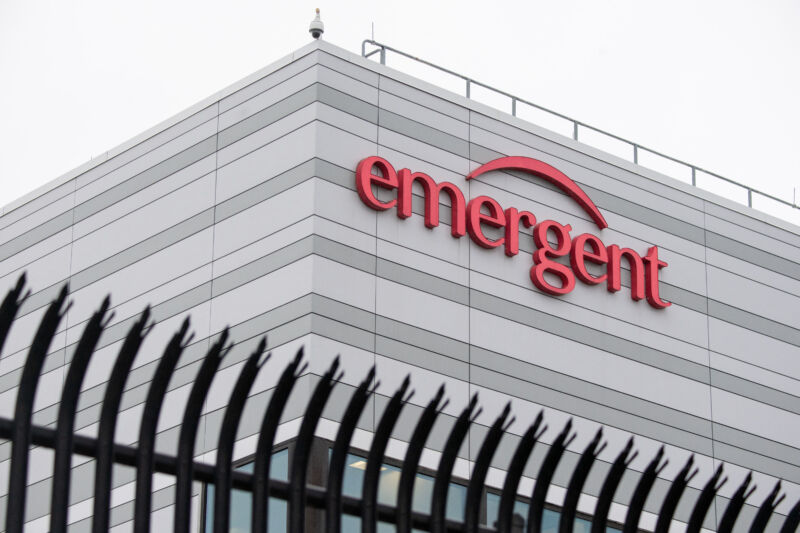
The US Food and Drug Administration is making progress in its efforts to sort out the fiasco at Emergent BioSolutions’ Baltimore facility, which, at this point, has ruined more than 75 million doses of COVID-19 vaccines stemming from what the regulator identified as significant quality control failures.
In March, news leaked that Emergent ruined 15 million doses of Johnson & Johnson’s vaccine as well as millions more doses of AstraZeneca’s vaccine. The spoilage happened when Emergent cross-contaminated batches of the two vaccines with ingredients from the other.
Last week, the FDA told Emergent to trash about 60 million more doses of Johnson & Johnson’s vaccine due to similar contamination concerns, The New York Times reported.
But at the same time, the agency cleared 10 million doses of Johnson & Johnson’s vaccine for use—with the catch that the doses must carry a warning saying that the FDA cannot guarantee Emergent followed good manufacturing practices while making them. And on Tuesday, the FDA cleared an additional 15 million doses of Johnson & Johnson’s vaccine, bringing the total number of acceptable doses to just 25 million, according to The Wall Street Journal.
Still, more than 100 million finished doses of Johnson & Johnson’s and AstraZeneca’s vaccines are still in limbo at the facility, awaiting FDA review. All of the doses at the facility were made prior to April 16, when the FDA shut down production after an investigation found sweeping and significant quality control failures and manufacturing violations.
Some lawmakers say the issues were clear before the investigation; Emergent has a long track record of such problems, as well as trouble fulfilling contracts.
Troubled past
In spite of the prior issues, the manufacturer was contracted during the pandemic to produce both the Johnson & Johnson one-dose vaccine and the AstraZeneca vaccine. The two vaccines are manufactured on similar adenovirus-based platforms. Emergent had also been awarded millions of dollars in federal grants to help respond to the pandemic swiftly, including $27 million monthly “reservation” payments to keep its facility at the ready to produce large amounts of vaccine under proper manufacturing standards and practices.
But the FDA’s nine-day inspection of the Baltimore facility, which began April 12, revealed that Emergent wasn’t putting that money to good use. FDA inspectors logged a long list of problems, including unsanitary conditions, paint peeling off of the walls and floors, black and brown residue on surfaces, improperly trained staff, and numerous opportunities for vaccine products to be contaminated. For instance, inspectors witnessed Emergent employees dragging unsealed, non-decontaminated bags of medical waste across different areas of the facility. In some cases, employees tossed unsealed bags of medical waste in an elevator.
Though Emergent had already scrapped the initial 15 million contaminated vaccine doses at the time, FDA inspectors concluded that “there is no assurance that other batches have not been subject to cross contamination,” the inspectors wrote.
The FDA shut down production April 16 and has been sorting through the premade doses ever since. For the most part, Emergent’s failures have not had a significant impact on vaccination efforts in the US. All of the doses of Johnson & Johnson vaccine administered in the US were made in the Netherlands. And demand for the one-shot vaccine has slipped amid slowed vaccination rates and concern over an extremely rare but life-threatening blood-clotting condition. In fact, US regulators recently extended the expiration data on millions of doses that have gone unused. AstraZeneca’s vaccine, meanwhile, is not yet authorized for use in the US.
However, Emergent's failures have global effects—many of the doses have been earmarked to be donated to other countries in need of vaccine supplies. The contamination problem has held up the export of potentially usable doses.
In a statement Tuesday after the FDA cleared the additional 15 million doses, Emergent said:
We welcome the approval of an additional batch of J&J vaccine made at Emergent. We remain committed to addressing the FDA’s observations in order to resume production as soon as possible and look forward to continuing our work to end this pandemic.
Federal officials stripped Emergent of its control of the Baltimore facility back in April, putting Johnson & Johnson in charge and telling AstraZeneca to find another manufacturer. Federal lawmakers, meanwhile, opened a multipronged investigation into whether Emergent used ties to the Trump administration to improperly obtain lucrative government contracts.
reader comments
79